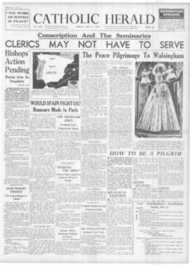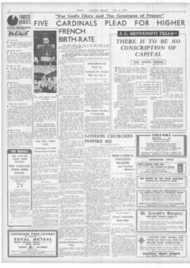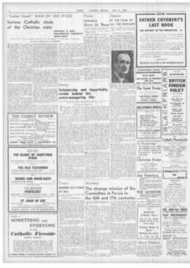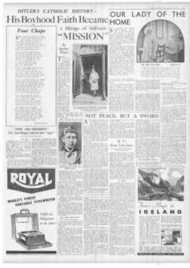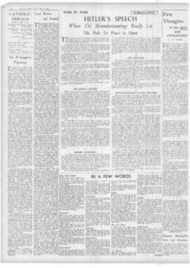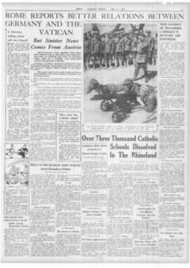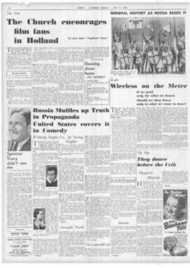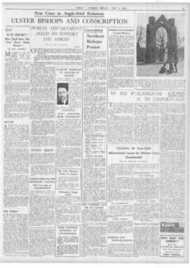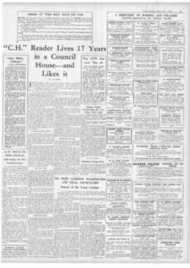Page 12, 5th May 1939
Page 12
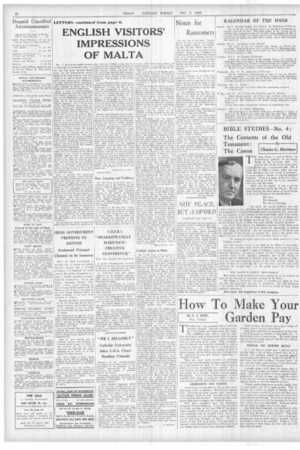
Report an error
Noticed an error on this page?If you've noticed an error in this article please click here to report it.
Tags
Share
Related articles
The Catholic Island Of Malta
The Vigil Pilgrims Cheered In Malta
Britain And The Knights Left Their Mark On This Sunny Island
O F Course, When St. Paul Landed On Malta He Was
Pope Pius Xii And Sir John Barbirolli
ENGLISH VISITORS' IMPRESSIONS OF MALTA
SIR,-It grieves me sorely to have to challenge an honoured visitor to our tiny but most beloved island home, for the characteristic which delighted St. Paul with his visit still clings to us, and no doubt with still
greater force because of our Catholicity. Yet Lady Winefride Elwes' impressions -and they are only impressions-may be taken seriously in Malta and, I am afraid, will hit hard the wrong people.
When I wrote of English-speaking Catholic chaplains I did not mean naval and military chaplains only, but also other priests, English-born and Englishbred, who do regularly attend to the needs not of the Servicemen but of English residents. For a list of such priests and churches where there are English notices and English sermons Lady Winefride Elwes could easily look up the English Catholic Directory. I would not, of course, be sorry if there were more priests on this list : the more the better. But I do say that the actual demand is amply met, and further, that one must bear in mind the fact that along with the English-born priests and military chaplains there is quite a fair number of Maltese priests who speak good English, and in fact, even better than the English families that come to Malta, but, unfortunately, those who speak English only do not go to Maltese priests. There are also two English newspaper dailies, managed by Catholics, and It is for them, as it is the custom of the Maltese papers, to inform their readers of all diocesan enactments.
I would beg Lady Winefride Elwes to reflect that, the question of the official language of the Curia is something altogether different from mere acts of courtesy, an also that this question should not be mixed up with any question connected with the local Catholic Action. I would refer Lady Winefride Elwes to my letter published in the CATHOLIC HERALD of April 14. In it I gave the reasons why the Curia continues in the traditional way.
Signs of common and uncommon courtesy-and I repeat: courtesy is one of our national characteristics-from the Curia and clergy have never been lacking, and if one takes into consideration the troubled political atmosphere of the island in these last years, one must admit that it is remarkable how well the clergy have tried to meet the demands of the Government. So much appears, at any rate, from the report of the Royal Commission. But I dare add that no one could echo my statements better than the present Governor, Sir Charles Bonham-Carter, who in his recent visits to the several parishes in the island has had excellent popular receptions organised by the parish priests and local clergy, for which, and for other social services rendered by the clergy during the September crisis His Excellency officially thanked them in his speech at Candelmas.
My contention is-and I feel sure that Lady Winefride Elwes will uphold me in this -that the Catholic clergy and the Curia should not be dragged, directly or indirectly, into taking sides in the present political impasse, especially now that conflicting passions have reached the boiling point, but should keep aloof, absolutely aloof, faithful to Our Lord's assertion : " My Kingdom is not of this earth."
If Lady Winefride Elwes insists on an English translation of the Curia official documents, I would ask her to consider. the incongruity of posting up circulars, pastoral letters, church notices, banns, etc., in three languages, one for the sake of courtesy, another for the sake of tradition, and a third in the language of the people for whom those documents are intended. Still, if a time is to come when such a change will be necessary, it can only be when neither the Government or the population find in the change itself anything to object to.
Finally, Lady Winefride Elwes writes : " The fact that certain elements among the clergy warn their flocks against the English as a godless race is surely playing into the hands of Italian political propaganda." Is this an " impression " or was it an ugly day-dream in the warm, soft breeze of Malta? Whatever it may have been, Lady Wincfride Elwes certainly does not weigh her words, which are no less than a very grave insult to the Maltese clergy, "a body of men who (to quote the CATHOLIC HERALD Malta correspondent, March 17) have ever been loyal to the British connection." To Lady Winefride Elwes' statement there is only one reply possible : It is simply not true; and consequently, I ask her, for that very Faith common to us both, to withdraw it. What the clergy do warn their flock against is the unabashed and openly loose morals of many non-Catholic Britishers, many of them of low type, as was excellently pointed out by 'he CATHOLIC HERALD Malta correspondent in his letter just mentioned.
EDWARD COLEIRO,
London, N.W.8.
Race, Language and Traditions
sm-Mr Grech is perfectly right in assuming that I am unaware of the advance made in the study of Maltese Philology. It is difficult to keep pace with the arbitrary and acrobatic changes in the Maltese vernacular. Take, for instance, my own family name. Less than 200 years ago it used to be written Bugejano, to become eventually Bugeyya and Bugeja, and now is evidently changing once more into Bugejja.
According to the late Prof. Tagliaferro, who certainly cannot be accused of political bias, there are to be found
in i Maltese vernacular over 8,000 neo-Latin words. The advocates of pure Maltese are practising a very curious method to eliminate all supposed impurity-a lucky dip in one of the Semitic dictionaries, and the trick
is done with results that surpass all understanding. A new dialect is introduced which is understood only by the " dippers."
Nor is the status of the Maltese more stable that its Philology. Promoted to a fully fledged language less than ten years ago, in the last few weeks it has been deemed unworthy of being used as a medium of debate in the Council Chamber.
I did not invent the number of neoLatin words. When I call Maltese a dialect, I am following the Orientalists Marmot, Erpennius, Gesenius, Stuinme, Noldeke, and others. When I say that our culture is Latin, I am but repeating what was said by Annibale Preca, whose work to establish Maltese as a language puts him above any suspicion. Maltese is dear to all my countrymen, and I, for one, would be more than pleased if it ever evolved into a language. But we resent the unorthodox methods adopted by our neoPhcenicians to foist on us this hybrid production.
My contention that the Maltese belong to an Occidental race is basedthough not exclusively-on the following documentary facts. In km 1240 the population of Malta was composed of 47 Christian families, 681 Arab families, and 27 Jewish families. Conditions on the smaller island of Gozo were a little better : the population consisted of 203 Christian families, 155 Arab families, and only eight Jewish families. Taking the two islands together, the proportion of Christians was a little over one in three; but in Malta, just one in fifteen. This was the position 150 years after Malta had been conquered from the Arabs by the Normans. But were the 47 Christian families all Maltese? It is difficult to hazard an opinion. Mr Grech's family name, for instance, is a reminder that Malta, before the Arab domination, had been for 500 years under Byzantium. However, some time about this period the Christians in Malta were reinforced, as it were, by the immigration of the whole population of Celano in Calabria, whose city had been razed to the ground by the Emperor Frederick II. From that time until well into the present century the immigrations from the nearby continent have never ceased. For every Maltese name in Malta there are ten which are not of Maltese origin.
The figures given above for the population of Malta in 1240 are quoted from Act. Imperil fined. seculi XIII et XIV, Tom. I, pag. 713 et seqq.-E. Winkelmann, Innsbruck, 1880. Opinions differ as to the date when the population of Celano was brought. to Malta; some give 1223 and others twenty years later. I would like very much to know which one of the two dates Mr Grech accepts, because in either case his pure Maltese theory is founded on a dream; he cannot reject this ethnological element without rejecting at the same time all historical values. And if the immigration from Celano occurred in 1223 has Mr Grech any proof to show that at the time there were any Maltese left on the island? • Bochart, ambassador of Frederick Barbarossa at the Court of Saladin, writing in 1175, says the inhabitants of Malta were all Arabs and he found no Christians there. If Mr Grech gave a little more time to ethnology and history, I am sure he would realise how flimsy are the grounds on which the pure Maltese theory is founded.
HENRY Bt'GEJA, O.P.
Catholic Action in Malta
Ste,-I was very much surprised to read that, according to Fr. H. B. L. Hughes, who has recently returned to Rome from Malta, " at the back of Mr Olivieri-Munroe's mind there probably lurks a suspicion that the most ardent defenders of the use of the Maltese language in island affairs, including, unfortunately, a little clique firmly entrenched in the ranks of Catholic Action, are dubious in their loyalty to the British flag." As this is altogether inconsistent with the views of the Times of Malta, edited by Mr Olivieri-Munroe, and its Maltese equivalent. 11-Berk a, may I, one of these most ardent defenders of the Maltese language, suggest that there must be some misunderstanding? Fr. Hughes may not know that. these " most ardent defenders of the Maltese language " are not so popular with a certain section of Maltese society just because they are not sympathetic to anti-British bias. So, after all, Fr. Hughes's opinion makes a delightful change!
I quite agree with Fr, Hughes that the leaders of Catholic Action in Malta should clear themselves of all suspicion. But the trouble with these leaders is not that they are ardent defenders of the Maltese language in Island affairs, but that they don't even bother to publish their newspaper, Lchen Is-seuva, in decent Maltese and in the standard orthography. As Lady Winifred Elwes wrote: " it seems rather ill-placed that when the Government has decided to adopt a definite orthography In Maltese the local Catholic newspaper should go out of its way to employ a different Italianised version," I wish to add that the Catholic paper in question, when it was edited by Mgr. Bonnici, used a better orthography, not very different from the standard one now taught in the Government schools, till the new editor, giving himself away a little too badly, replaced it by an Italianised version, deliberately inconsistent, devised by Di-. Enrico Mizzi, the leader of the Nationalist party, in whose programme there is little sympathy for the Maltese language and British culture. Dr. Mizzi, as a clever politician who knows where to hit and wound a movement which he does not like is certainly within his rights, but not so Lchen Is-sculta, whose sudden change was taken as a policy of offensive opposition from unexpected quarters, which also explains why it has since forfeited the confidence and respect of all those Maltese Catholics who refuse to encourage making a stick of the organ of Catholic Action to beat the Government with or to discourage those Maltese scholars, including a splendid minority of priests, who want to make of Maltese a uniform medium of popular education and enlightenment, As things are, Lehen Is-scuua cannot but seriously interfere with the work of our school teachers, and this is, to say the least, not edifying.
We certainly wish well to Catholic Action that has a great mission in Malta; but is it asking too much if we suggest that its organ should be kept absolutely above suspicion of political bias?
These are the facts that might interest Fr. Hughes.
J. AQUILINA. London, S.W.S.
blog comments powered by Disqus


